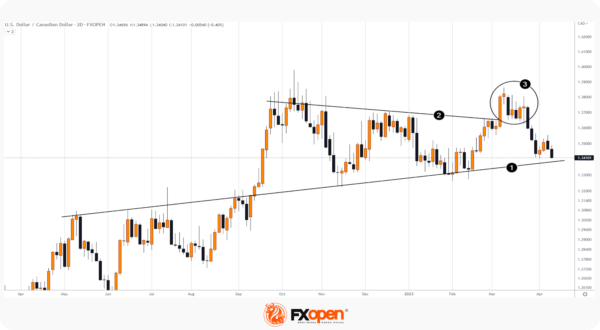A short digest of the fresh and saturated news background:
→ Inflation in the US coincided with analysts’ expectations. Core CPI was 5.6% in annual terms. The main problem for suppressing inflation is the rise in prices for energy resources (oil has updated the maximum of the year). According to Bloomberg, the union of Russia and Saudi Arabia in the oil market can create problems in this regard.
→ Minutes of the Fed meeting showed that officials expect a mild recession.
→ The ECB believes that inflation has become more extensive in Europe, but the lion’s share of increases is already behind.
→ The Bank of Canada left the rate unchanged at 4.5%, expecting a fall in inflation, but is ready for further increases if necessary.
Reacting to the above and other important news, the US dollar index fell to the lows of the year on the foreign exchange market. Accordingly, the euro, pound and Canadian dollar strengthened. The latter forms a pattern that attracts attention.
On the USDCAD chart, we can observe a narrowing triangle (1-2), indicating the balance of supply and demand. The breakdown of the (3) triangle in March turned out to be false. By its behaviour, the market suggests that the true exit from the triangle will take place in a bearish direction. And this could be the beginning of a long-term downtrend.

